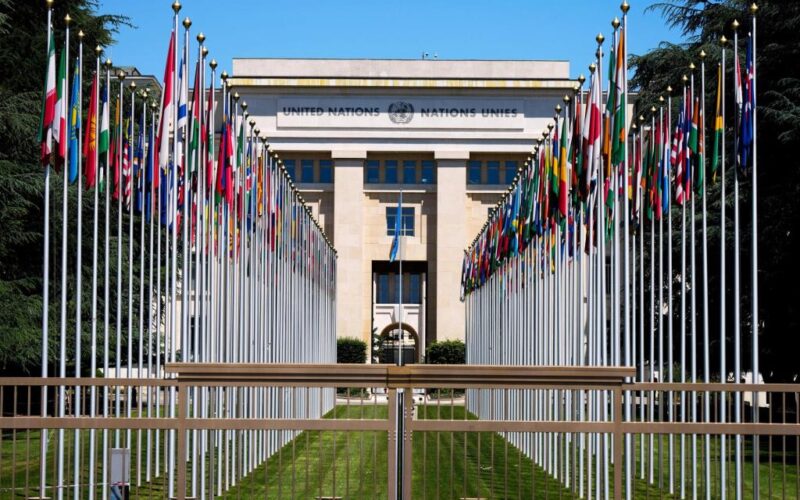By EDITH M. LEDERER
UNITED NATIONS (AP) — The United Nations, a collaborative global dream built into reality out of the ashes of World War II, marks its 80th anniversary this month. There’s little to celebrate.
Its clout on the world stage is diminished. Facing major funding cuts from the United States and others, it has been forced to shed jobs and start tackling long-delayed reforms. Its longtime credo of “multilateralism” is under siege. Its most powerful body, the Security Council, has been blocked from taking action to end the two major wars in Ukraine and Gaza.
And as the latest conflict between Israel, Iran and the United States flared, it watched from the sidelines.
Four generations after its founding, as it tries to chart a new path for its future, a question hangs over the institution and the nearly 150,000 people it employs and oversees: Can the United Nations remain relevant in an increasingly contentious and fragmented world?
With its dream of collaboration drifting, can it even survive?
An act of optimism created it
When the United Nations was born in San Francisco on June 26, 1945, the overriding goal of the 50 participants who signed the U.N. Charter was stated in its first words: “to save succeeding generations from the scourge of war.”
Earlier this year, U.N. Secretary-General Antonio Guterres sounded that same theme: “Eight decades later, one can draw a direct line between the creation of the United Nations and the prevention of a third world war.”
There has been no such war — thus far. But conflicts still rage.
They continue not only in Gaza and Ukraine but Sudan, eastern Congo, Haiti and Myanmar – to name a few – and, most recently, Iran and Israel. The needs of tens of millions of people caught up in fighting and trapped in poverty have increased even as rich donor nations, not just the United States, are reducing their aid budgets.
The U.N. General Assembly is planning a commemoration on the 80th anniversary on June 26. This week an exhibition on the San Francisco meeting opened at U.N. headquarters with a rare centerpiece — the original U.N. Charter, on loan from the U.S. National Archives in Washington.
But the mood in the halls of the U.N. headquarters in New York is grim.
Diplomats are anxious about the immediate future, especially the outcome expected in August of a U.S. review of the United Nations and other multilateral institutions ordered by President Donald Trump. And U.N. staff here and in more than 60 offices, agencies and operations that get money from its regular operating budget are facing 20% job cuts, part of Guterres’ reform effort and reaction to already announced Trump funding cuts.
“It’s not something to celebrate,” Kazakhstan’s U.N. Ambassador Kairat Umarov said of the upcoming anniversary.
“This should be united nations — not disunited,” he said. “Collectively, we can do a lot,” but today “we cannot agree on many things, so we agree to disagree.”
A changing world accommodated a changing UN
In a different world of land-line telephones, radios and propeller planes, the U.N. Charter was signed by just 50 nations — mainly from Latin America and Europe, with half a dozen from the Mideast, and just a few from Asia and Africa.
Over the decades, its membership has nearly quadrupled to 193 member nations, with 54 African countries now the largest bloc followed by the 54 from Asia and the Pacific. And the world has changed dramatically with the advent of computers and satellites, becoming what the late former Secretary-General Kofi Annan called a “global village.”
The U.N. system has also expanded enormously from its origins, which focused on peace and security, economic and social issues, justice and trusteeships for colonies.
Today, the map of the U.N. system looks like a multi-headed octopus with many tentacles — and miniature tentacles sprouting from those. In 2023, its secretariat and numerous funds, agencies and entities dealing with everything from children and refugees to peacekeeping and human rights had over 133,000 staff worldwide.
Kishore Mahbubani, who served twice as Singapore’s U.N. ambassador, credited the United Nations with thus far preventing World War III. While there are still wars, deaths have continued a long-term decline “and the world is still, overall, a much more peaceful place,” he said.
“And many small states still live in peace, not having to worry about the neighbors occupying them,” said Mahbubani, a respected geopolitical analyst.
Mahbubani and others also point to successes in the 71 U.N. peacekeeping operations since 1948, including in Angola, Cambodia, Sierra Leone (which is currently a member of the Security Council) and Liberia (which will join in January).
There is also wide praise for specialized U.N. agencies, especially those dealing with hunger, refugees and children as well as the International Atomic Energy Agency, which is the U.N’s nuclear watchdog, and the International Telecommunications Union. Among numerous responsibilities, it allocates the global radio spectrum and satellite orbits and brings digital connectivity to millions.
As Guterres told the Security Council earlier this year, “The United Nations remains the essential, one-of-a-kind meeting ground to advance peace, sustainable development and human rights.”
What actually gets done at the UN?
Every September, world leaders get a global platform at the General Assembly. And every day their ambassadors and diplomats meet to debate issues from conflicts to climate change to the fight for gender equality and quality education. Sometimes, such talks produce little or no results. At others, achievements get overlooked or ignored by the broader world community, far from the hubs of diplomacy.
And the Security Council is the only place where Russia and Ukraine regularly face off over the ongoing war following Russia’s 2022 invasion — and where the Palestinian and Israeli ambassadors frequently confront each other.
Despite its successes and achievements over past decades, Singapore’s Mahbubani called the U.N. today “a very sad place,” lamenting that Guterres had failed “to inspire humanity” as the late Pope Francis did. “But,” Mahbubani said, “it should celebrate the fact it is alive and not dead.”
John Bolton, a former U.S. ambassador to the United Nations who was national security adviser during Trump’s first term, was also critical of the state of the U.N. in 2025. “It’s probably in the worst shape it’s been in since it was founded,” said Bolton, now an outspoken Trump critic.
He pointed to gridlock in the Security Council on key issues. He blames rising international tensions that divide the council’s five veto-wielding powers – with Russia and China facing off against U.S., Britain and France on many global challenges.
Richard Gowan, U.N. director of the International Crisis Group, a think tank, said the United Nations has bounced from crisis to crisis since the 1990s. With the gloomy geopolitical picture and U.S. funding cuts impacting humanitarian operations, he said this “is not just another blow-up that will blow over.”
“Everyone seems to be resigned to the fact that you’re going to have a smaller U.N. in a few years’ time,” Gowan said. “And that is partially because virtually every member state has other priorities.”
What happens in the UN’s next chapter?
Guterres has launched several major reform efforts, getting approval from U.N. member nations last September for a “Pact for the Future” – a blueprint to bring the world together to tackle 21st-century challenges. Gowan said Guterres’ successor, who will be elected next year and take over in 2027, will have to shrink the organization. But many cuts, consolidations and changes will require approval of the divided U.N. membership. Possible radical reforms include merging U.N. aid and development agencies to avoid duplication.
Don’t forget, says Gowan, that a huge amount of diplomatic business — much of it having nothing to do with the United Nations — gets done because it is in New York, a place to have those conversations.
“If you were to close the U.N., there would also be a lot of intelligence people and spies who would be deeply disappointed. Because it’s a wonderful place to cultivate your contacts,” Gowan said. “Americans may not realize that having the U.N. in New York is a bonanza for us spying on other nations. So we shouldn’t let that go.”
Ian Bremmer, who heads the Eurasia Group, a political risk and consulting firm, said the Trump administration’s attempts to undermine the United Nations — which the United States conceived in 1945 — will make China more important. With Trump exiting from the World Health Organization, the U.N. agency helping Palestinian refugees known as UNRWA and cutting humanitarian funding, he said, China will become “the most influential and the most deep-pocketed” in those agencies.
Bremmer, who calls himself a close adviser to Guterres, insisted the United Nations remains relevant — “with no caveats.”
“It’s a relatively poorly resourced organization. It has no military capabilities. It has no autonomous foreign policy,” Bremmer said. “But its legitimacy and its credibility in speaking for 8 billion people on this little planet of ours is unique.”
He added: “The important thing is that as long as the great powers decide not to leave the United Nations, every day that they stay is a vote of confidence in the U.N.”
Expansion of the U.N. Security Council is probably the most fertile area for potential change. Decades of discussions have failed to agree on how to enlarge the 15-member council to reflect the global realities of the 21st century, though there is wide agreement that Africa and Latin America deserve permanent seats.
Singapore’s Mahbubani said he believes the United Nations “will definitely survive.” The “genius” of its founders, he said, was to give the big powers after World War II a veto in the Security Council, preventing the global body from dying as its predecessor, the League of Nations, did. That survival, Mahbubani believes, will continue: “It will,” he said, “outlast us all.”
Edith M. Lederer, chief correspondent at the United Nations, has been covering international affairs for more than half a century.
Originally Published:











